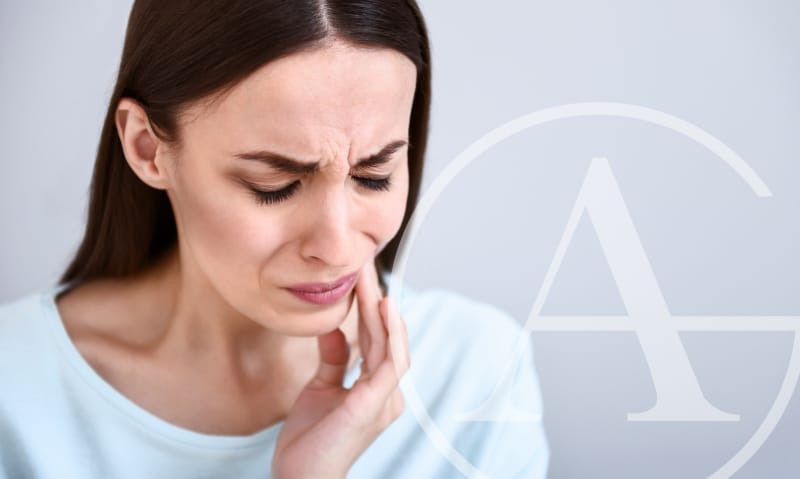Does TMJ Disorder Impact Your Life? It Doesn’t Have to Any Longer!

Need help for TMJ disorder?
Jaw pain is like an earache or a toothache: If you have one, it can be all-encompassing, making it hard for you to sleep, relax, or focus. But temporomandibular joint (TMJ) pain doesn’t have to impact your life. Trust us—there is relief out there. Read on to learn more about TMJ disorder and how you can get help.
If you suffer from jaw pain, you may need help for TMJ disorder. Think of your temporomandibular joints as the most complex joints in your body. They work like sliding hinges, connecting your lower jaw to the rest of your skull. Both jaw joints work together, moving in sync. No other joint in your body functions that way.
Unfortunately, jaw pain can radiate to other parts of your body. If you have TMJ disorder, you will likely experience referred pain and difficulty sleeping at night.
TMJ Pain
Undue pressure or misalignment of the jaw can result in various TMJ symptoms, such as a headache, facial pain, earache, neck pain, and shoulder pain. But because everyday activities like eating and speaking require use of the TMJ, any discomfort associated with it can negatively impact your life. Many patients who suffer from TMJ disorder indicate that it makes it hard to function.
Poor Sleep
Again, because the TMJ is such a crucial part of the body, it can impact your sleeping ability. Of course, numerous factors can affect your quality of sleep. Stress from work, children’s activities, and financial concerns put additional pressure on the body. And for many people, it can cause a condition called bruxism, characterized by jaw clenching and teeth grinding.
Bruxism occurs when jaw muscles exert too much pressure on teeth, jaws, and joints. All that grinding can cause long-term damage to your teeth. But unfortunately, it gets worse. If you grind your teeth at night, it can also impact the quality of your partner’s rest. So not only will you likely not sleep well, but your partner may not be able to either.
TMJ Treatment To Ease Your Jaw Pain
If you have TMJ disorder, your dentist can help. Typical treatments include:
1. Over-the-Counter (OTC) Medications
Most dentists and primary care providers recommend the use of acetaminophen or ibuprofen to help control jaw pain and inflammation related to TMJ disorder. Occasionally, your dentist will prescribe a muscle relaxer to provide additional comfort. Follow manufacturer specifications for dosage requirements and provider recommendations before taking any OTC or prescribed medications.
2. Personalized Physical Therapy
Sometimes your provider may recommend that you see a physical therapist for personalized exercises to help relieve jaw pain and discomfort. During your initial session, the therapist will look at your jaw mobility and see where you are carrying tension in your jaw, neck, head, and surrounding areas. They will then work with you on a customized plan that could include joint mobilization, myofascial techniques, and electrical stimulation.
3. Custom Orthotic Appliance (Oral Appliance)
Your dentist may recommend using an oral appliance to help relieve your TMJ disorder. These oral appliances reposition your bite to alleviate your TMJ symptoms. When your bite is misaligned, your entire body is affected, and it can cause constant muscle tension.
Some patients think of sports mouth guards when they think of oral appliances. However, custom appliances for TMJ treatment are much more tailored. Your dentist will custom-design your appliance so that you get the best results possible.
4. At-home Relaxation Techniques
One of the biggest reasons people need help for TMJ disorder is because they are under stress, which puts undue pressure on their bodies. If stress contributes to your jaw pain, your doctor might recommend that you try some relaxation techniques at home. Deep-breathing exercises are a great way to open your airway and raise your oxygen levels. Not only does this help improve your overall energy level, but it is also good for your brain. Try taking a few deep breaths periodically throughout the day to help clear your mind and put your body at ease.
Constant exertion of the jaw can be tiring and can also be a contributor to jaw pain. We recommend that if you are experiencing TMJ pain, you avoid chewing on hard, crunchy, or chewy foods. We also recommend that you refrain from chewing gum.
Let Dr. Alhadef be your neuromuscular dentist in Dallas.
Are you ready to relieve your TMJ symptoms and be free of jaw pain? If so, Dr. Alhadef at Dallas Cosmetic Dental is happy to be your neuromuscular partner. Request an appointment today so we can help your TMJ pain disappear.